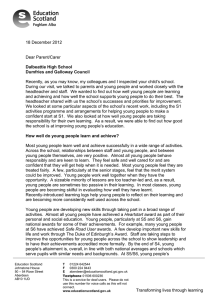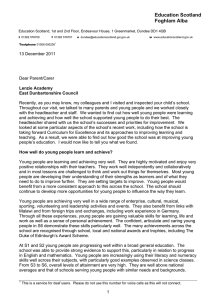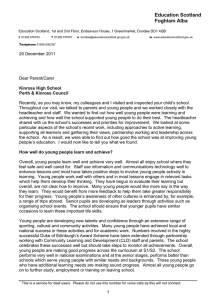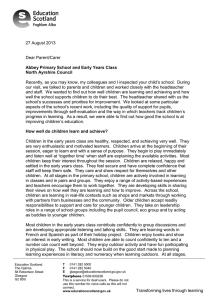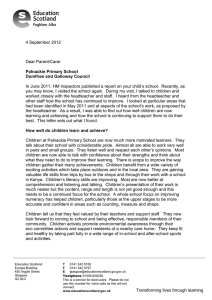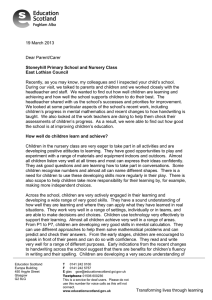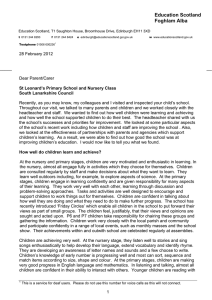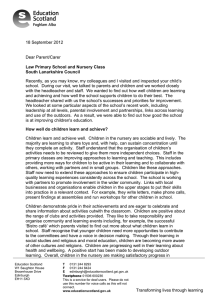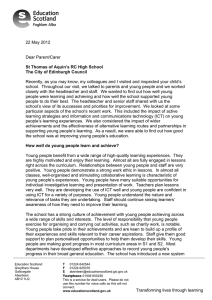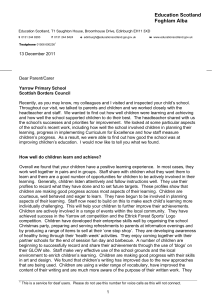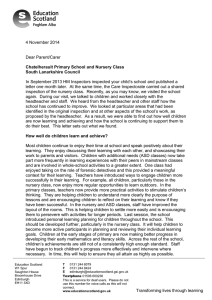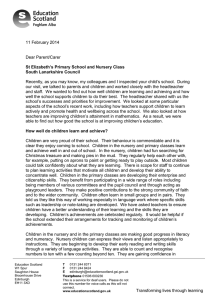23 October 2012 Dear Parent/Carer
advertisement
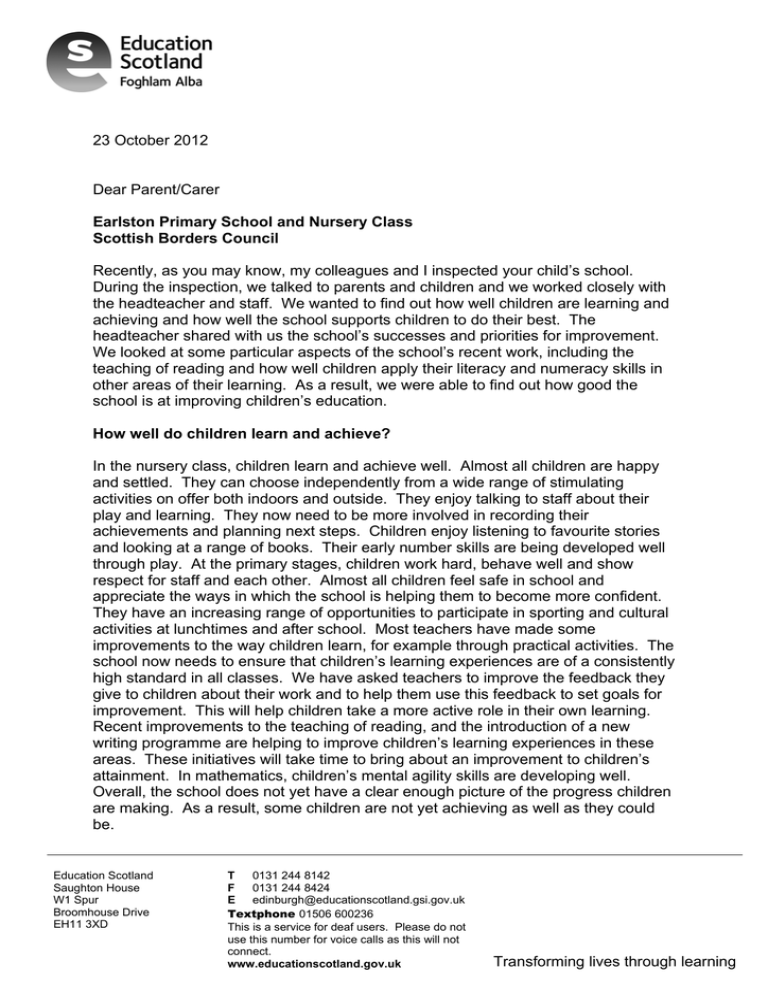
23 October 2012 Dear Parent/Carer Earlston Primary School and Nursery Class Scottish Borders Council Recently, as you may know, my colleagues and I inspected your child’s school. During the inspection, we talked to parents and children and we worked closely with the headteacher and staff. We wanted to find out how well children are learning and achieving and how well the school supports children to do their best. The headteacher shared with us the school’s successes and priorities for improvement. We looked at some particular aspects of the school’s recent work, including the teaching of reading and how well children apply their literacy and numeracy skills in other areas of their learning. As a result, we were able to find out how good the school is at improving children’s education. How well do children learn and achieve? In the nursery class, children learn and achieve well. Almost all children are happy and settled. They can choose independently from a wide range of stimulating activities on offer both indoors and outside. They enjoy talking to staff about their play and learning. They now need to be more involved in recording their achievements and planning next steps. Children enjoy listening to favourite stories and looking at a range of books. Their early number skills are being developed well through play. At the primary stages, children work hard, behave well and show respect for staff and each other. Almost all children feel safe in school and appreciate the ways in which the school is helping them to become more confident. They have an increasing range of opportunities to participate in sporting and cultural activities at lunchtimes and after school. Most teachers have made some improvements to the way children learn, for example through practical activities. The school now needs to ensure that children’s learning experiences are of a consistently high standard in all classes. We have asked teachers to improve the feedback they give to children about their work and to help them use this feedback to set goals for improvement. This will help children take a more active role in their own learning. Recent improvements to the teaching of reading, and the introduction of a new writing programme are helping to improve children’s learning experiences in these areas. These initiatives will take time to bring about an improvement to children’s attainment. In mathematics, children’s mental agility skills are developing well. Overall, the school does not yet have a clear enough picture of the progress children are making. As a result, some children are not yet achieving as well as they could be. Education Scotland Saughton House W1 Spur Broomhouse Drive EH11 3XD T 0131 244 8142 F 0131 244 8424 E edinburgh@educationscotland.gsi.gov.uk Textphone 01506 600236 This is a service for deaf users. Please do not use this number for voice calls as this will not connect. www.educationscotland.gov.uk Transforming lives through learning How well does the school support children to develop and learn? Staff in the nursery and primary classes provide a bright, welcoming and safe place in which children can learn. Lessons meet the learning needs of a majority of children but for some children the work is too easy. Teachers need to be clearer about what children already know and can do and plan well-paced learning which is at the right level for all children. Class teachers and support assistants provide valuable support for those children who require additional help to make progress. The school has developed a range of effective links with community groups, other agencies and partner schools to support children’s learning. For example, visiting therapists and a home link teacher provide valuable support for a few children and their families. We have asked the school to look at how the contribution made by specialist support for learning teachers can be more effective. The school has improved some aspects of its curriculum. For example, in a few classes teachers are helping children to make connections in their learning across different subjects. Overall, the school has not yet made sufficient progress in introducing Curriculum for Excellence. Staff need to make better use of assessments and develop programmes which provide progressive, coherent and challenging learning across all subjects. Children have begun to develop and apply their literacy and numeracy skills in other areas of their learning but need more opportunities to do so. How well does the school improve the quality of its work? Teachers are becoming increasingly skilled at reflecting on their own practice. Some staff share successful strategies with one another and this good practice should be extended. You as parents welcome the opportunities you have to comment on the work of the school. Children are able to influence some improvements but need a stronger say in decisions which affect them. The headteacher has implemented a good range of ways to evaluate the work of the school. However, these approaches are not always leading to improvements in learning and teaching. The headteacher understands the need to bring about clear and sustained improvements to the quality of education which the school provides. Some staff, including the depute headteacher and principal teachers, have successfully led developments, for example, improvements to the school’s writing programme. This approach to shared leadership should now be extended to include all staff and, where appropriate, parents and children. This inspection of your school and nursery class found the following key strengths. • • • Confident, well-behaved children who show respect for adults and each other. The school’s success in working with community partners. Children’s learning experiences in the nursery class. We discussed with staff and the education authority how they might continue to improve the school. This is what we agreed with them. • • Ensure consistently high-quality learning experiences across classes and help children to learn how to evaluate and improve their learning. Monitor children’s progress and achievement effectively to ensure all children make appropriate progress. 2 • • Improve the curriculum. Increase the impact of self-evaluation on learning and teaching and involve fully all staff, children and their parents. What happens at the end of the inspection? We are satisfied with the overall quality of provision. We are not entirely confident that the school’s self-evaluation processes are leading to sufficient improvement, particularly in the curriculum. As a result, we will work alongside the local authority to provide support for the school. Our Area Lead Officer will discuss with the local authority the most appropriate way to do this in order to build capacity for improvement and will maintain contact to monitor progress. Parents will be informed of the extent to which the school has improved. Elaine Merrilees HM Inspector Additional inspection evidence, such as details of the quality indicator evaluations, for your school can be found on the Education Scotland website at http://www.educationscotland.gov.uk/inspectionandreview/reports/school/primsec/Ea rlstonPrimarySchoolScottishBorders.asp Please contact us if you want to know how to get the report in a different format, for example, in a translation. You can contact us at enquiries@educationscotland.gsi.gov.uk or write to us at BMCT, Education Scotland, Denholm House, Almondvale Business Park, Almondvale Way, Livingston EH54 6GA. If you want to give us feedback or make a complaint about our work, please contact 01506 600200, or write to us at the above address or e-mail: feedback@educationscotland.gsi.gov.uk. 3
